The Upskilling for Canada’s Climate Transition research project is a collaboration between the Academy for Sustainable Innovation and the Resilience by Design Lab at Royal Roads University, in partnership with the Government of Canada’s Future Skills Centre. To identify the steps needed to upskill the workforce to support Canada’s climate transition, this research partnership aims to better understand:
- The skills, competencies and attributes needed for individuals to take climate action within various leadership and vocational pathways;
- Opportunities for Canadian organizations to work together to advance climate action knowledge, skills and competency development; and
- Key considerations relating to credentialing, credit transferability, and recognition of prior learning to validate these new skills.
To test our initial research findings, a survey was conducted in May – June 2023. In total, 157 individuals responded, and from their responses we learned that cost, external course value and course design are key factors that shape one’s interest in participating in a short-duration course. We recognize that short-duration training can come in the form of courses, programs, and micro-credentials (a quality-assured, assessed record of focused learning achievement with stand-alone value that may also contribute to other credentials¹), but for the purposes of this blog and in alignment with the survey conducted, we will be referring to these as “short-duration courses.”
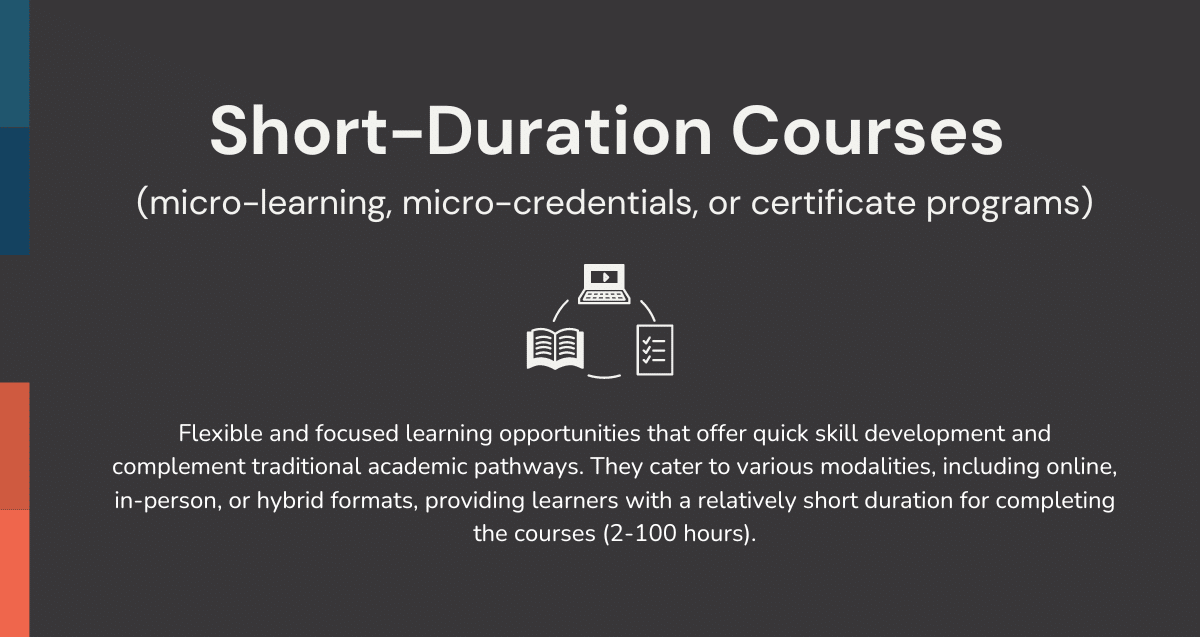
BIPOC respondents and early career professionals are most impacted by course cost
Cost was the most important factor shaping respondents’ interest and capacity to take a short-duration course but differences emerged when data was disaggregated by career stage and race. 49% of respondents as a whole ranked cost as being extremely important while 56.8% of early career professionals and 69.2% of career explorers reported cost as being extremely important to their decision to take a short course.
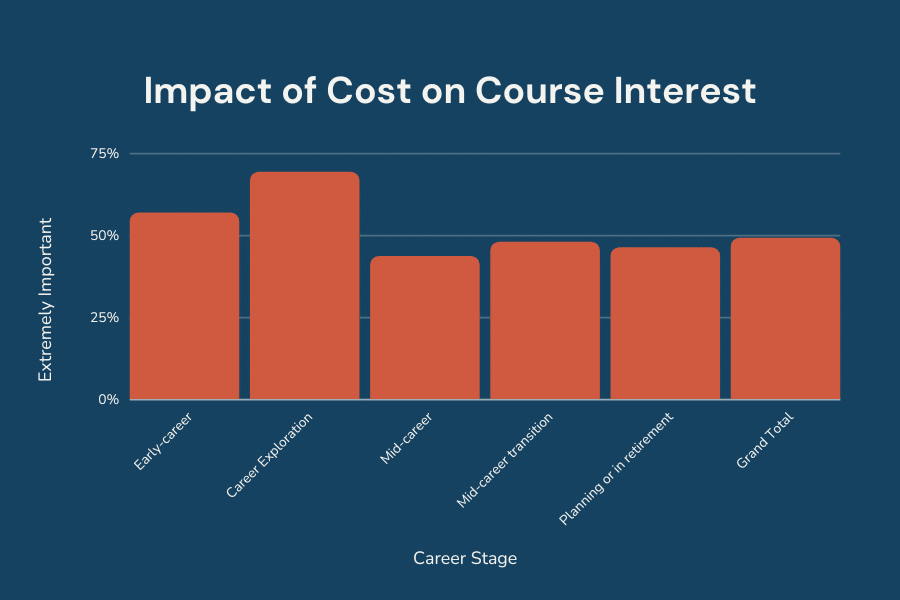
When data was disaggregated by race, 68% of BIPOC participants and 40% of white participants reported cost to have an extremely important impact on their interest in enrolling in a short-duration course. 77.8% of Black respondents and 75% of South Asian participants ranked cost as being extremely important. Participants noted that employer-supported professional development opportunities are limited, therefore having free, low-cost, or subsidized courses available helps ensure participants from diverse backgrounds can access learning opportunities to develop climate action competencies.
External Value, Accredited Institutions and Employer Influence
Respondents in career transitions reported the highest level of interest in short-duration courses. 56.5% of people transitioning mid-career and 48.7% of early career professionals reported being extremely interested in taking a short course compared to 43.6% of general respondents.
Across participants, the external value of a course and the possibility of getting a formal credential mattered more than having an employer that encouraged or mandated a course as part of job requirements.
External recognition and formal credentials were most important to younger, less experienced and BIPOC respondents. 66.7% of respondents 20-24 and 63% of respondents with three years or less of experience ranked the external value of a course and a formal credential as extremely important compared to 45.9% of general respondents. 77.8% of Black respondents and 68.8% of South Asian respondents ranked external value and formal credentials as extremely important.
Existing post-secondary institutions and recognized training organizations are key players in creating valued climate action pathways. The reputation of the delivering institution of a course mattered most to respondents with less career experience. 51.9% of respondents with 1-3 years of experience ranked accreditation as extremely important compared to 31.9% of general respondents. This factor was even more important to respondents at the beginning of their career journey, with 61.5% of respondents with no experience and 54.6% of respondents with less than 1 year of experience ranking accreditation as important compared to 42.7% of general respondents.
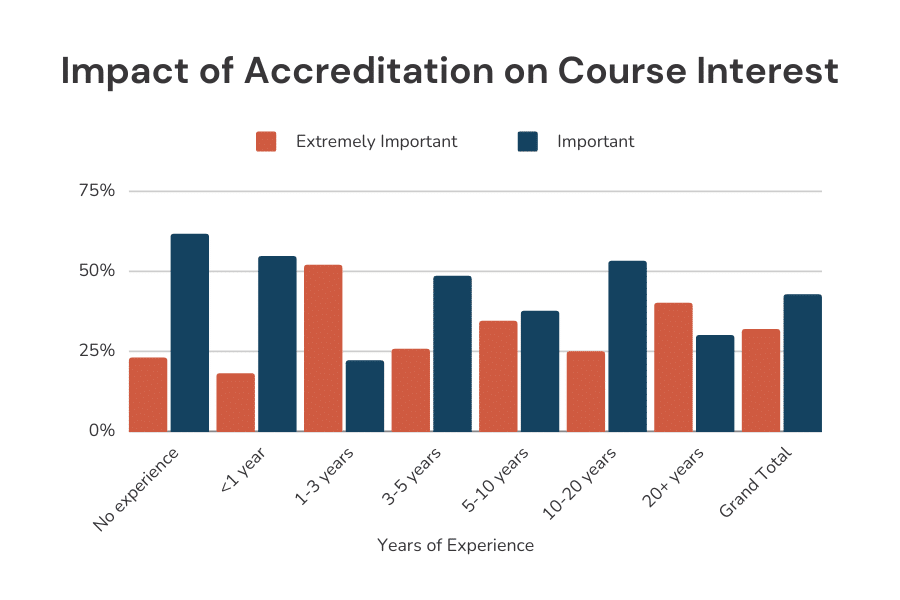
In comparison, 16.6% and 44.6% of respondents rated an employer requiring a course or a course being suggested by an employer as extremely important and important respectively. There were no major differences in the disaggregated data with regards to the impact of employers on course interest.
Preferred Methods of Learning
Synchronous virtual learning in short-duration courses was the preferred learning method for survey respondents.
42.7% of respondents chose virtual learning as their preferred course delivery method with hybrid learning and in person learning chosen by 29.9% and 10.2% of respondents respectively. No strong preferences emerged in the type of online learning with 33.1% of respondents preferring synchronous and 29.3% of respondents preferring asynchronous online learning.
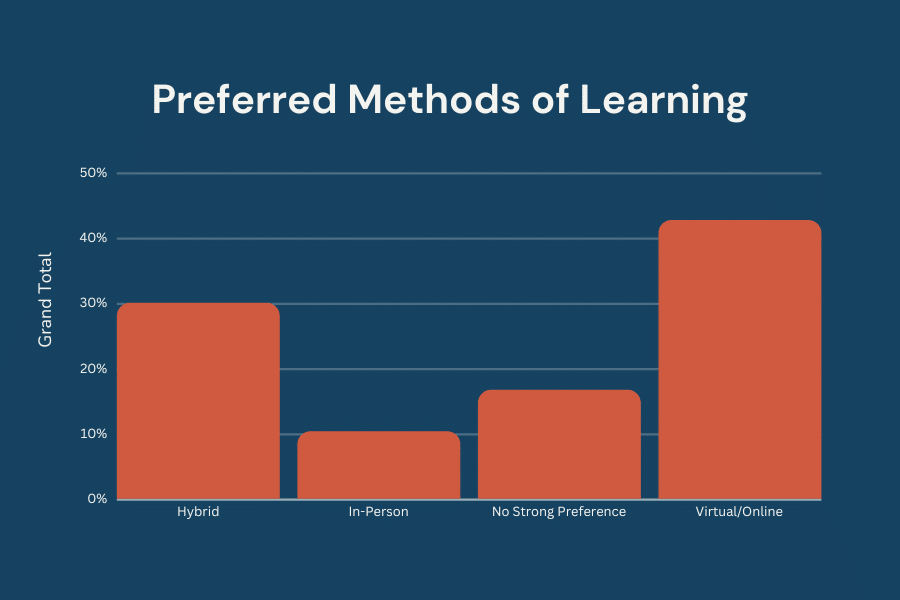
Key components of a learning experience
Respondents to this survey emphasized the importance of accessible, tailored, meaningful courses that offer ample opportunities to connect with others.
Above all, respondents emphasized that the time and financial investment required to participate in a short course shaped their capacity to participate. 54.1% of participants preferred training that lasted days to weeks and shared that having time available during work hours to complete course work is important. This aligns with other research that training fees, foregone income from time taken away from work to participate in training, and the time and knowledge required to navigate the training landscape are all barriers that hinder workers from participating in skill development opportunities.²
Alongside cost, participants shared that they wanted customizable, engaging and tailored courses that are valued by employers, that improve participants’ job prospects and market value and that help them prepare for the specific climate challenges related to their field. The career boosting effect of courses was mentioned more frequently than the environmental impact of the course content. Respondents were interested in courses customized to be regionally specific, tailored to specific jobs or organizations and clearly differentiated from existing courses and offerings.
Finally, respondents were interested in developing relationships with other learners through their course experiences. Respondents shared that they were interested in interactive learning experiences that offer practical case studies, project-based learning, international perspectives, diverse educators and courses that can be “stacked” and applied towards a longer certificate, diploma or degree.
Centering Learner Needs in the Development of Upskilling Opportunities
What we’ve learned from the preliminary results of this survey is that the majority of participants are interested in upskilling, and are looking for opportunities that are more accessible, from a time commitment, cost, and delivery style perspective. The data collection for our Upskilling for Canada’s Climate Transition project is now complete, and we are working to summarize what we’ve learned overall. We invite you to sign up for our ASI newsletter to stay up-to-date on our progress and learn more about our results as they’re released!


